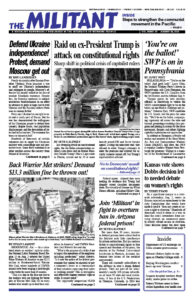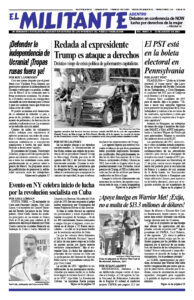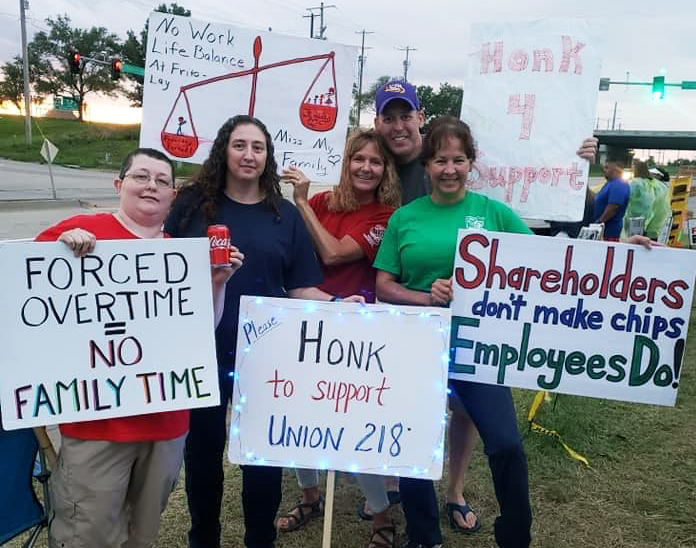By a significant margin in a statewide referendum Aug. 2, voters in Kansas rejected an amendment to the state Constitution that would have made it read it “does not create or secure a right to abortion.” Hundreds of thousands voted it down as a way to limit the state’s lawmakers from carrying through on announced plans to strictly curtail access to abortion. Their decision keeps the door open for further discussion and debate by working people.
The outcome of the vote strongly confirms that the U.S. Supreme Court’s Dobbs v. Jackson Women’s Health Organization ruling in June — which held the 1973 Roe v.Wade decision unconstitutional — opens the door to serious, state-by-state debate over what best meets the needs of women today. The Kansas vote also gives the lie to the argument by liberals that the Dobbs ruling made abortion illegal.
Because of the deepening crisis of the capitalist system, working people today face mounting challenges to be able to start a family or hold one together, with real wages plunging under the impact of soaring prices for housing, child care, health care, food, fuel and other necessities. These conditions hit women workers the hardest.
The Kansas Department of Labor says that average real wages in the state fell by 1.8% last year, a figure that gives an indication, but doesn’t reveal the real depth, of the drop faced by workers.
Sky-high house prices and rising rents in Johnson County, Kansas, mean more workers and youth there are sharing accommodation. Just under half of all renters pay more than 30% of their income to the landlord. As demand for housing has risen, the Shawnee City Council adopted a not-in-my-backyard ordinance in May, banning more than three people who are unrelated from living in the same house.
The cost of infant care is “close to 30% of the median woman’s income in the state,” Donna Ginther, director of the Institute for Policy and Social Research at Kansas University, told the Kansas Reflector. Even for those who can afford child care, access to it is plunging, with 21 of the state’s 105 counties having no open slots for toddlers or infants last year. Thirty-five percent of households headed by a single mother in the state live in poverty.
Across the country more working people are looking for ways to use their unions to fight these attacks and defend ourselves. Some 800 workers at Frito-Lay in Topeka, Kansas, struck last summer. Members of the Bakery, Confectionery, Tobacco Workers and Grain Millers union won gains in their fight for better pay and against “suicide shifts” that were tearing family life apart.
Alongside the squeeze on living standards, working people confront a broader social crisis. Kansas was the state with the second highest percentage rise in drug overdose deaths last year. Nationwide, fatalities rose to an all-time record, going up by 15%, while in Kansas it was 43%. The sharpest increases have been in small towns and rural counties.
Voter turnout in the Kansas referendum, held at the same time as the midterm primaries, was more than double that of 2018. Over 900,000 people, nearly half of all voters, cast ballots on the issue. A majority of 59% to 41% voted to reject the amendment, with both registered Democrats and Republicans voting no.
Before the vote, Lori Chrisman, a leader of the Value Them Both Coalition, which backed the amendment, admitted that if it was passed she would push for new laws to criminalize abortion from the moment of conception.
Working people in the state have faced attempts to prevent women’s access to abortion in decades past. Hundreds of opponents of women’s rights blockaded and temporarily shut down abortion clinics in Wichita in 1991. Abortion provider George Tiller was shot dead in his church there by a rightist in 2009.
The outcome of the referendum was unanticipated by both liberal and conservative commentators. Republicans were convinced that the amendment they backed in Kansas would carry the day. Liberals consider Kansas a “flyover” state populated by bigoted and backward “deplorable” workers who had voted by 56% for Donald Trump in 2020. Neither of the bosses’ Democratic and Republican parties think working people are capable of acting to defend our own class interests.
Kansas law will now continue to allow abortions up to the 22nd week of pregnancy. The referendum shows that the Supreme Court’s Dobbs ruling did what it said it would do — return decision-making on abortion, a question on which opinions remain deeply divided, to “the people and their elected representatives.”
A broad social and economic crisis continues to bear down on working people and our families in that state and across the country, illustrating why we must use our unions to lead a fight for what we need — cost-of-living raises in all union contracts and social programs; affordable housing, child care and health care; access to adoption, and to family planning, including contraception and safe, secure abortions. Such a fight is the road to advancing the struggle for women’s rights.


